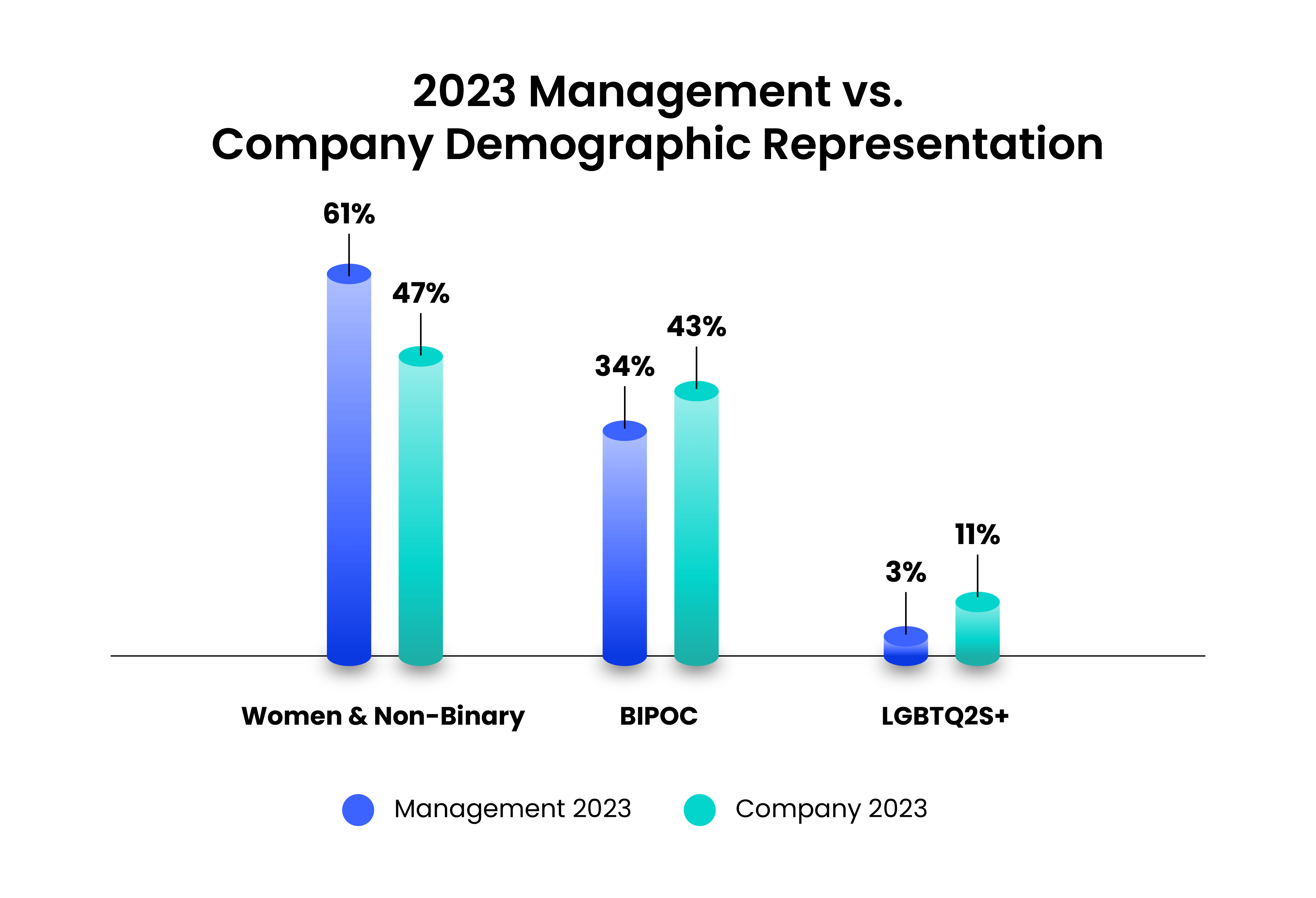Loopio’s Diversity, Equity, Inclusion, and Belonging Report
At Loopio, our goal is to build an organization where every team member feels like they belong. We are committed to building diverse teams, designing equitable systems, and fostering a culture of inclusion.

Our Commitment to Diversity, Equity, Inclusion, and Belonging (DEIB)
A Message from Our CEO
-
Zak Hemraj
Chief Executive Officer and Co-Founder
I have always believed that one of my primary responsibilities as a CEO is to build a safe, equitable, and inclusive company culture where individuals can thrive and feel like they belong. It’s not only the right thing to do, but it’s a necessity for innovation and business performance.
I was born in Canada, but my parents are South Asian and East African immigrants. Growing up, I found myself in the “middle” of cultural and generational differences. I was constantly searching for my own sense of belonging, which led to both challenging and energizing experiences. I didn’t know it back then, but in hindsight, my upbringing heavily influences how I lead today. It taught me that curiosity and compassion need to be at the forefront of every interaction and that progress is made by soliciting different perspectives for more creative, innovative, and successful outcomes.
Fast forward to 2014, when I started Loopio with my co-founders. We worked hard to build a culture we could be proud of, but our efforts around Diversity, Equity, Inclusion, and Belonging (DEIB) were mostly reactive. By 2020, it became apparent that we had lost our way, and we were less diverse than we wanted and needed to be. That year, we made our first formal business commitment to DEIB, which I am proud to say has proven to be an important part of our company’s growth and success over the past four years.
But we recognize that there is still more work to do.
As we reflect, a few things have become clear:
-
There is no magic formula or “playbook” for DEIB. Real change takes time and requires a commitment to continual listening, learning, and adapting.
-
Just like anything in business, DEIB requires a formal strategy with a clear vision, ambitious long-term goals, and a focus on short-term initiatives.
-
Leadership engagement, buy-in, and accountability are essential for change.
Our commitment to DEIB must be intentional and transparent to create a meaningful and sustainable impact. DEIB needs to be built into our business strategy so that it is part of everything we do as a company. And most importantly, as a leadership team, we need to set the tone from the top, take responsibility, and hold ourselves fully accountable for the outcomes.
I am humbled and proud to share this year’s Loopio DEIB Annual Report, in which we share what we’ve learned and accomplished to date and our DEIB strategy as we look ahead. I believe our approach is aspirational, but also achievable.
We have a lot more work ahead of us to achieve our goals, but we are all committed to continue learning, growing, and improving.

Reflecting on Our DEIB Journey So Far
At Loopio, we recognize we have a responsibility to foster a work environment where the diversity of our team reflects the communities where we live and work. Additionally, we know that our work on inclusion and diversity—as individuals, in our workplace, and in the technology community at large—is never done.
In 2020, we launched our first DEIB employee survey to better understand workplace demographics, employee experience, and year-over-year changes. We have continued to conduct this survey annually since the fall of 2020.
That first DEIB survey gave us an important baseline for tracking our workplace demographics. This method of benchmarking our progress against ourselves has helped us stay focused on what we can control: building a more diverse and inclusive company every year.
To conduct our DEIB surveys, we partnered with Culture Amp, an industry leader in transforming employee experiences through research-led initiatives. The survey is intentionally designed to protect employee privacy, so responses remain anonymous.
Since 2020, we have continued to listen and learn in formal and informal settings so our team can share their perspectives about their work experience. Listening to employees—or as we call ourselves “Loopers”—has been vital in helping us learn about our strengths, and opportunities for improvements. Below is a snapshot of what we’ve been doing to build room for ongoing feedback.
Building Room for Ongoing Feedback
- Listening Labs: Annually, an external third party holds voluntary, small-group discussions to provide a designated safe space for our employees. In the Listening Labs, Loopers share feedback on leadership, company values, and more. The findings are then shared with the senior leadership team for review and action.
- Ask Me Anything (AMA) Sessions With Senior Leadership: Several times throughout the year, we host company-wide and departmental AMA sessions. This is a chance for Loopers to ask senior leadership about business strategies, challenges, and whatever else may be top of mind.
- Pulse Surveys: Short, monthly surveys are sent to all employees to provide leaders with real-time feedback on topics related to company culture and the experiences of Loopers.

Sharing Our Findings
To ensure we are constantly reflecting, remaining transparent, and holding ourselves accountable, we have been sharing our findings publicly for the past few years—and this year is no different.
Our actions are guided by a 3-year DEIB strategy, for which we are in our second year. Our 3-year strategy helps to demonstrate our long-term commitment to DEIB, to drive accountability across the business, and to create a focused and measurable plan.
At the heart of this strategy is our #OneTeam commitment, which emphasizes that our greatest asset is our team, and we’re dedicated to investing in their success.
#OneTeam Commitment
We believe people are our superpower, and they fuel our ambitious vision. Our commitment is to build & maintain a diverse team with a culture of equity and inclusion–where every Looper can feel safe, respected, and that they belong.
Defining D-E-I-B
Words matter. That’s why we’re breaking down how we approach and define diversity, equity, inclusion, and belonging at Loopio.
At a high-level, the way we think about DEIB is that actions (what we do every day) show up in equity and inclusion, and the outcomes of those actions result in building a diverse workplace where people feel they belong. For example, we take actions to build equitable hiring practices (like having structured interview questions and a diverse talent pipeline) and those actions result in a more diverse workplace.
Below is what each of these words means to us.

-
Diversity
Diversity describes the attributes each Looper brings to work. We use the word diversity to refer to the various identities, backgrounds, or perspectives of any given group of employees. So, while an individual can add diversity to a team, an individual can also be diverse on their own.
-
Equity
Equity refers to the systems and processes we intentionally or unintentionally build and maintain at Loopio. Building equitable systems means ensuring our systems are designed for parity amongst our team.
-
Inclusion
Inclusion is about creating a culture that strives for equity while embracing, respecting, accepting, and valuing differences. Inclusivity is an action that an individual or team can consciously make to ensure that others feel they belong.
-
Belonging
Belonging is ensuring all Loopers feel welcomed, valued, respected, and safe to show up as their full, authentic self. Belonging matters because it is a key indicator of employee engagement. Belonging is also deeply connected to inclusion: feeling like we belong is the outcome of working in an inclusive workplace.
DEIB Survey Results: Demographic Representation
In our most recent survey in 2023, we learned a lot about how our workplace demographics have changed over the years. Here are some of the key highlights:
- 11% increase of women in management. From 2020 to 2023, we saw an increased representation of women in management, rising from 50% to 61%.
- 20% increase of BIPOC Loopers in management. From 2020 to 2023, we saw an increased representation of BIPOC Loopers in management from 14% to 34%.
- 12% increase in BIPOC Loopers overall. From 2020 to 2023, we saw an increase in our representation of BIPOC Loopers from 31% to 43%.
- 3% decrease in LGBTQ2S+ Loopers. From 2020 to 2023, we saw a decrease in LGBTQ2S+ representation from 14% to 11%.
As we look at these highlights over the last four years, we can see that our workforce has become more diverse in some key areas, most notably in representation of our BIPOC (Black, Indigenous & People of Colour) population. We also saw an increase in the representation of women in leadership roles at Loopio. However, we saw a decrease in LGBTQ2S+ Loopers, an area that we’d like to improve upon in the year ahead.
The increase of BIPOC Loopers, and women in management is directly tied to changes in our hiring strategies. We focused on building diverse talent pipelines for open roles, including structured interviews to make equitable hiring decisions, leveraging community partnerships, and slowly building a more diverse management team.
In 2023, we also had another significant milestone. Loopio announced our first acquisition and welcomed 30+ new Loopers from both the UK and India. This acquisition helped expand our team through geographic diversity, which resulted in new ideas, diversity of thought, new leadership, and even more cultural diversity at Loopio.
Diving Deeper into Employee Representation
The following is only a partial representation of the total data we garnered from our latest DEIB survey, which we ran in November 2023. Beyond the data shared below, we also surveyed for additional data related to other demographic identities/groups/associations, such as disabilities and conditions, religious affiliation, family status, education, and more.
Race and Ethnicity
As of late 2023, roughly 43% of our workforce identifies as BIPOC, 49% identifies as white, and 4% indicate they “Prefer Not to Answer,” with the remaining 4% choosing “Other.”
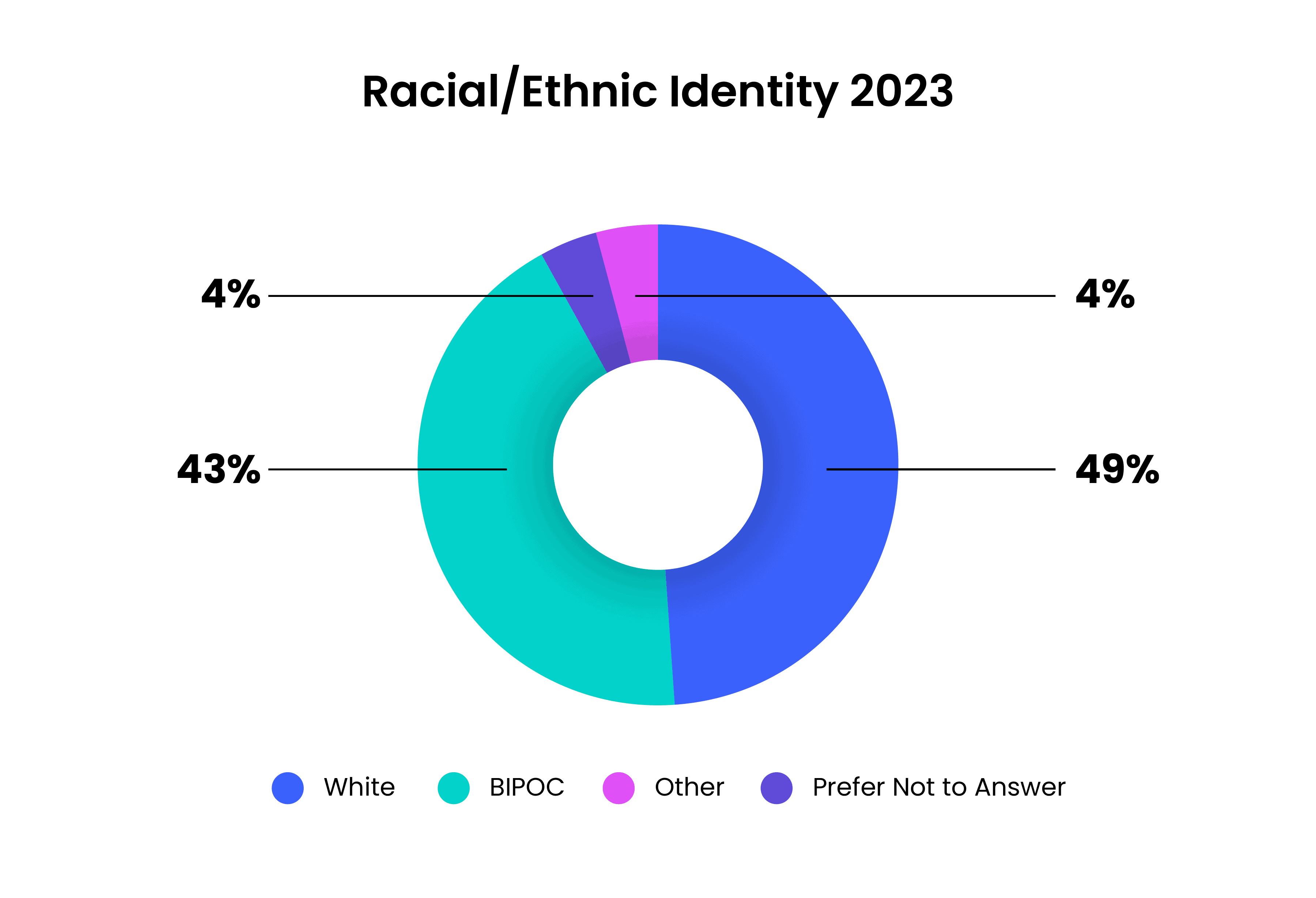
Below is how these results have shifted over the past few years at Loopio.
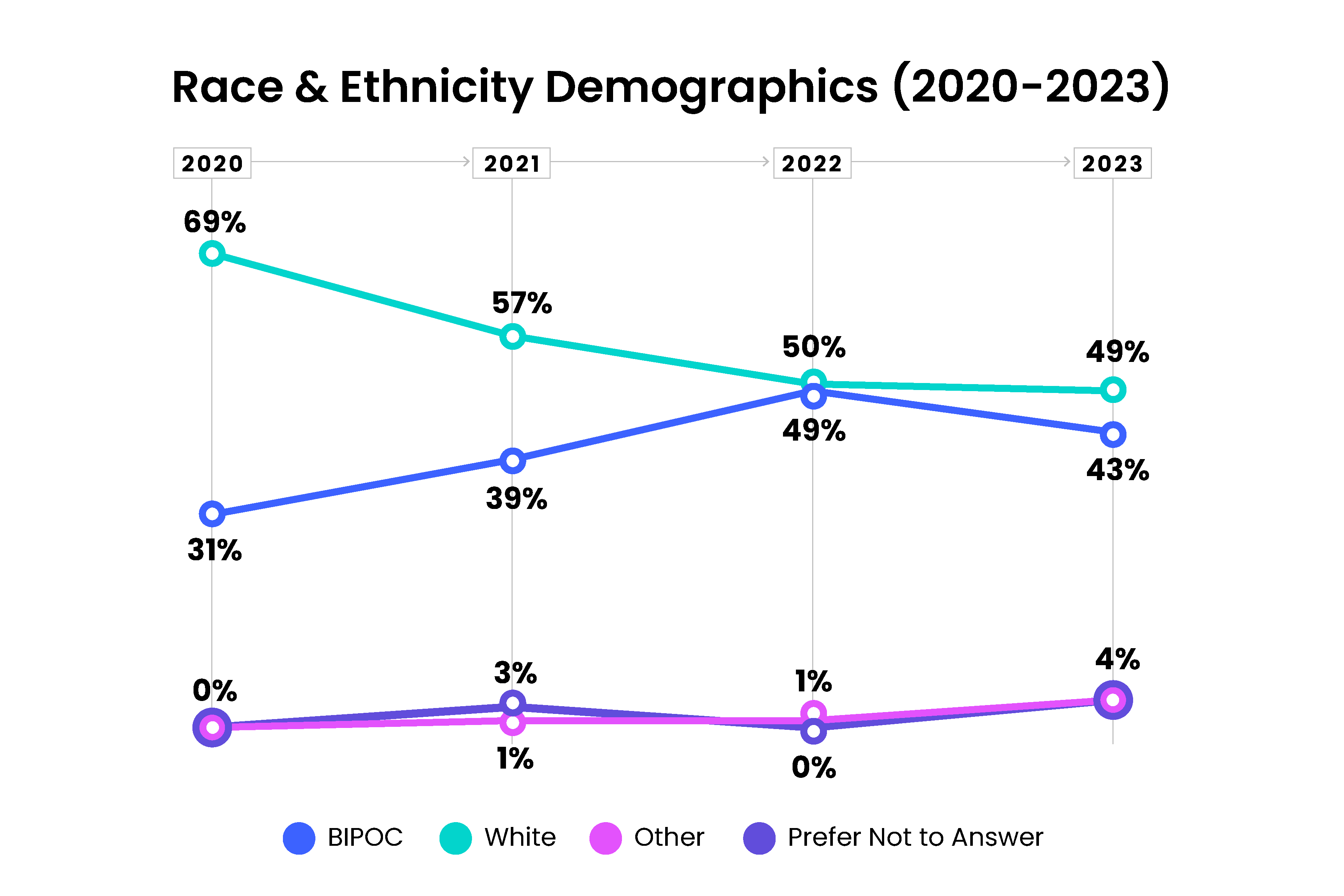
Gender
In 2023, we saw a strong representation of both men and women in the workplace, with just less than half the workplace identifying as a woman or non-binary.
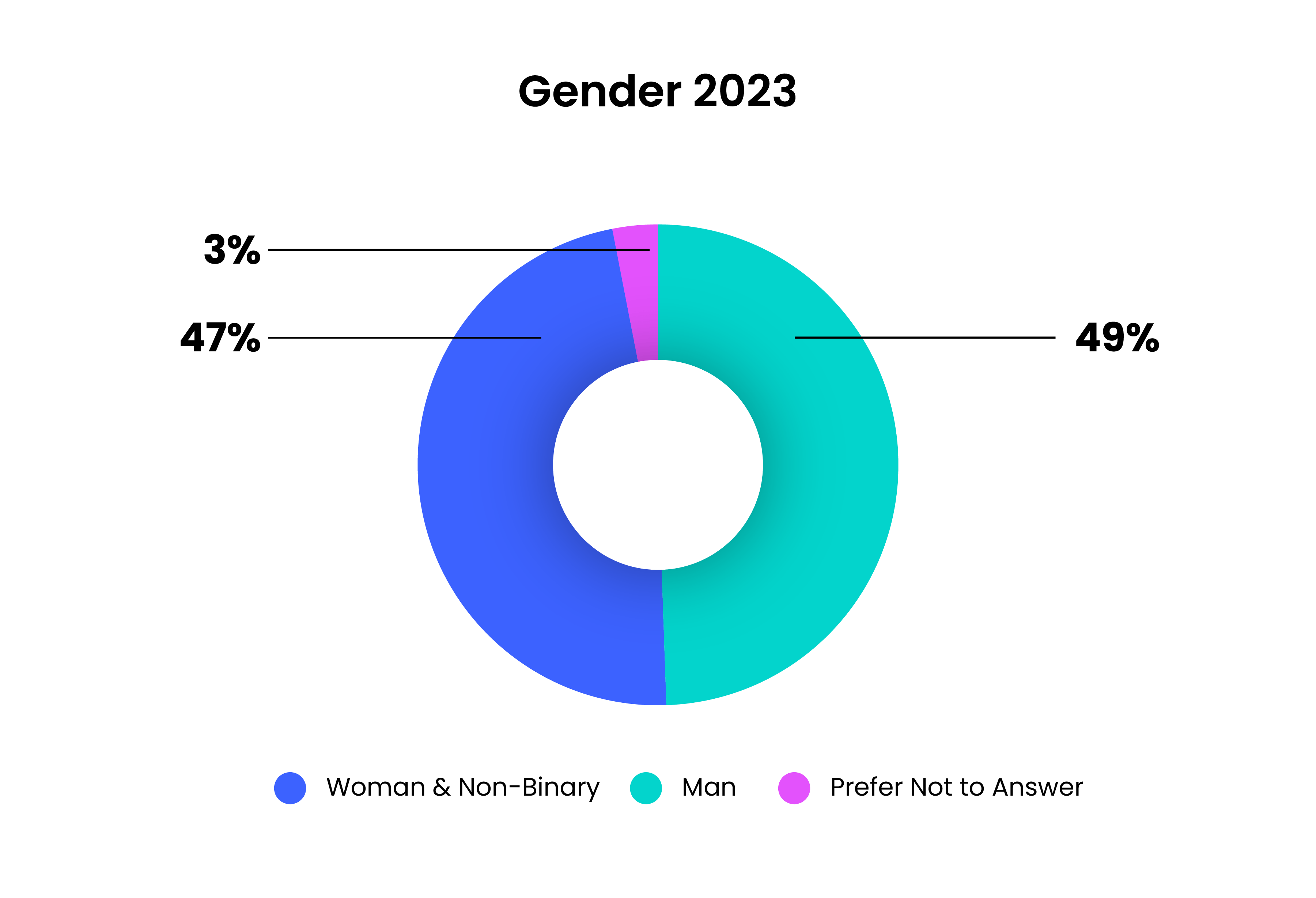
While we have a small group of employees who identify as non-binary, this group did not meet the reporting minimum (for confidentiality protection). For the survey results, we grouped non-binary responses with women.
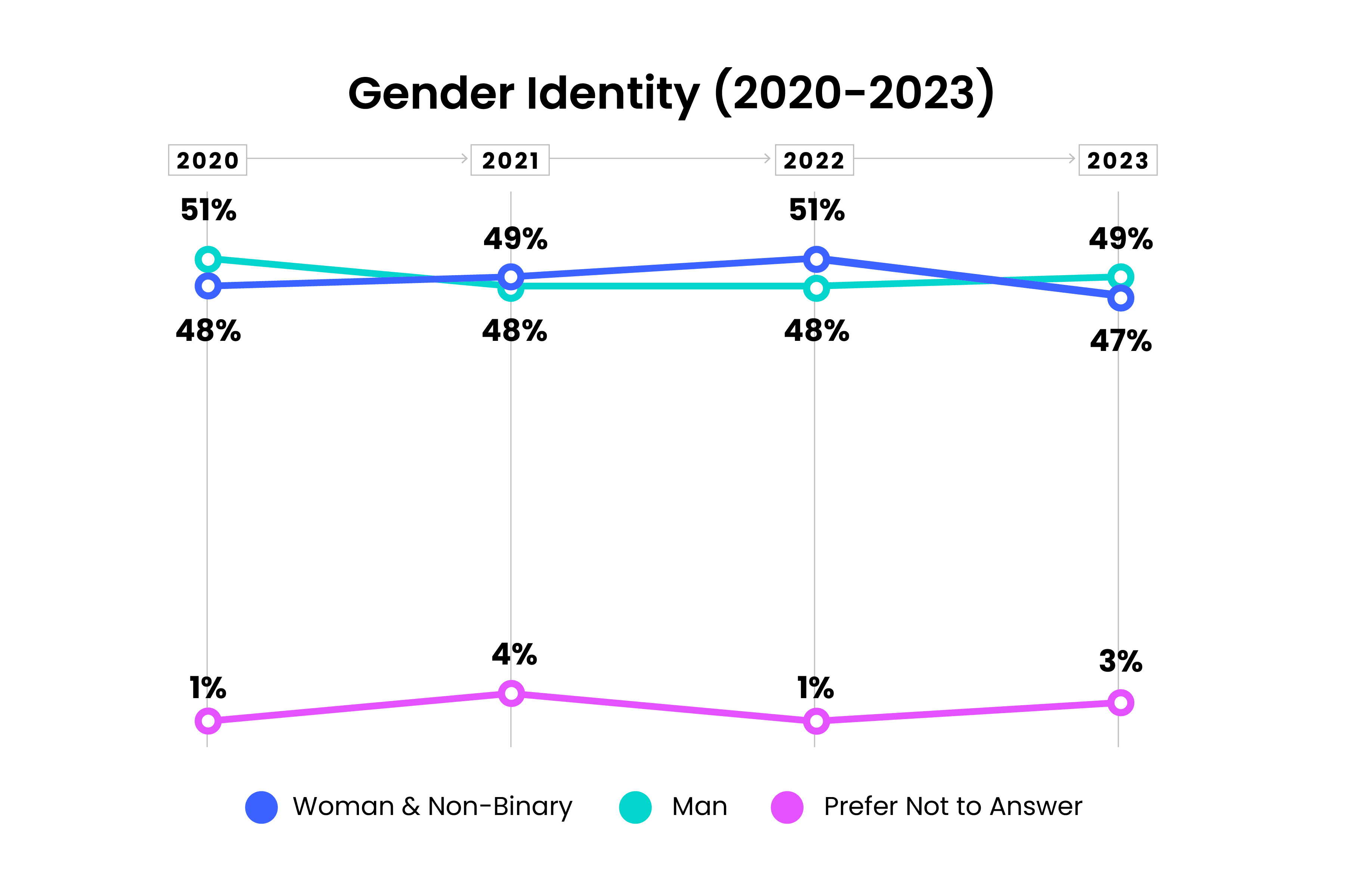
In our 2023 survey, we took a deeper dive into gender distribution by job level and department. We found that most job levels and departments were represented by 40% – 60% women.
But, when it came to job levels—which range from level 1: junior positions, to level 10: C-Suite—we found there were some exceptions. For example, at level 1 (generally represented by early career software developers and business development representatives), 27% of the team identified as women. And at level 10, 25% of our C-Suite identified as women.
Additionally, across departments, there were two exceptions. While most teams have a balanced representation of women and non-binary Loopers, 22% of our Engineering team identifies as women (a 3% drop from 2022). And, on our People team, 100% of the team identifies as women.
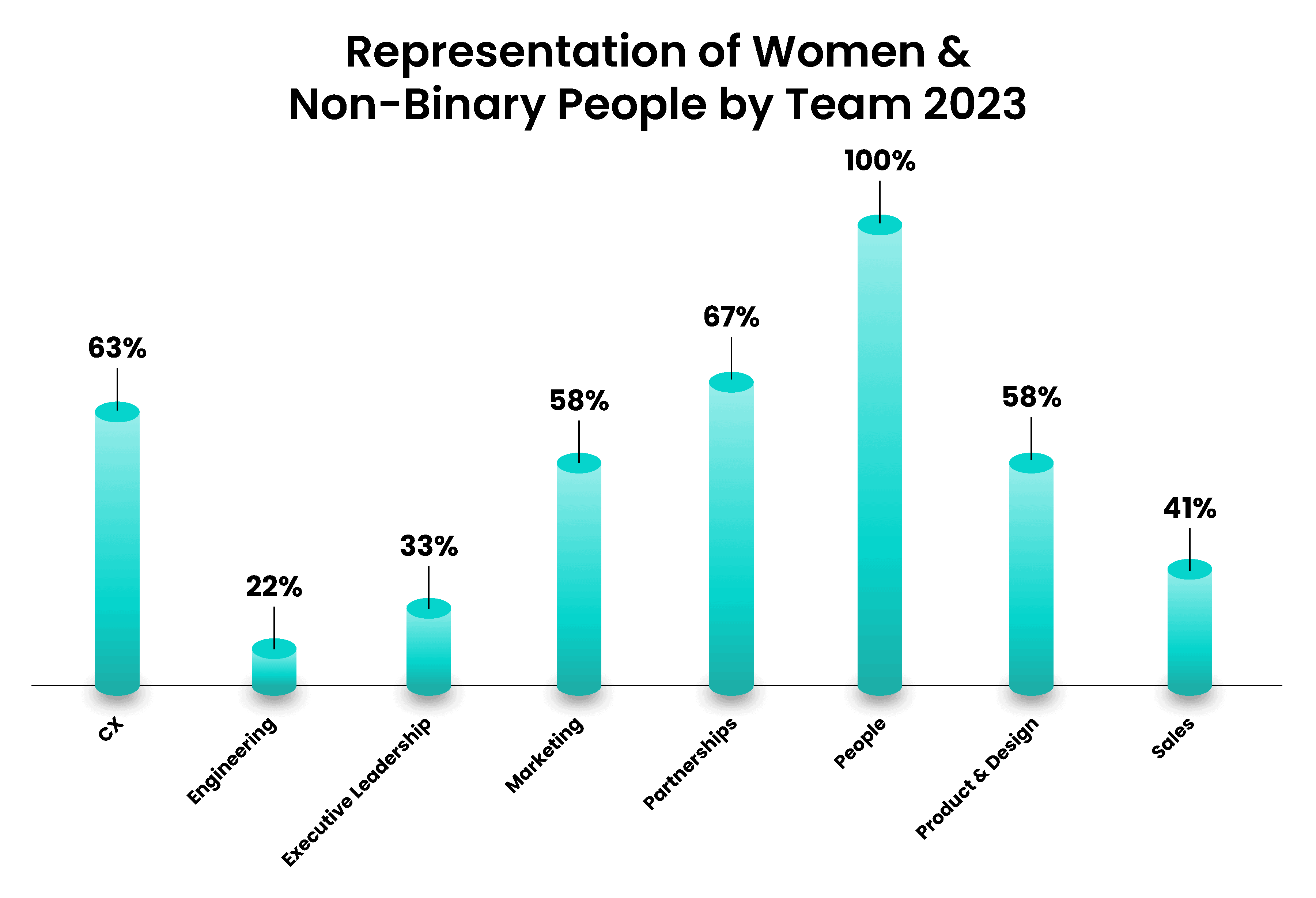
Sexual Orientation
In 2023, 11% of Loopers identified as part of the LGBTQ2S+ community, 85% identified as heterosexual, and 3% did not specify.
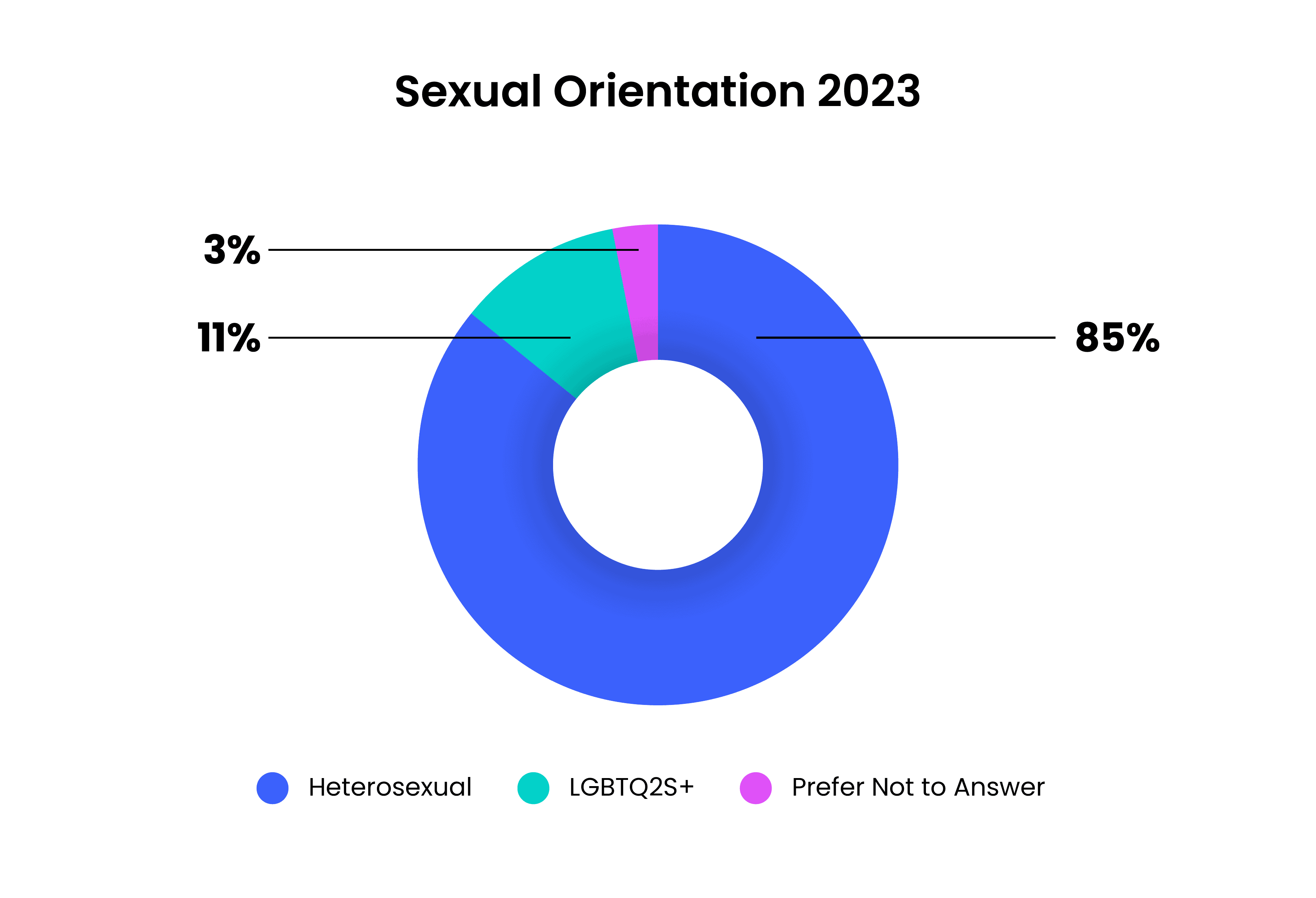
Below is how these results have changed over time. Compared to 2021, we saw a 5% drop in LGBTQ2S+ employee representation.
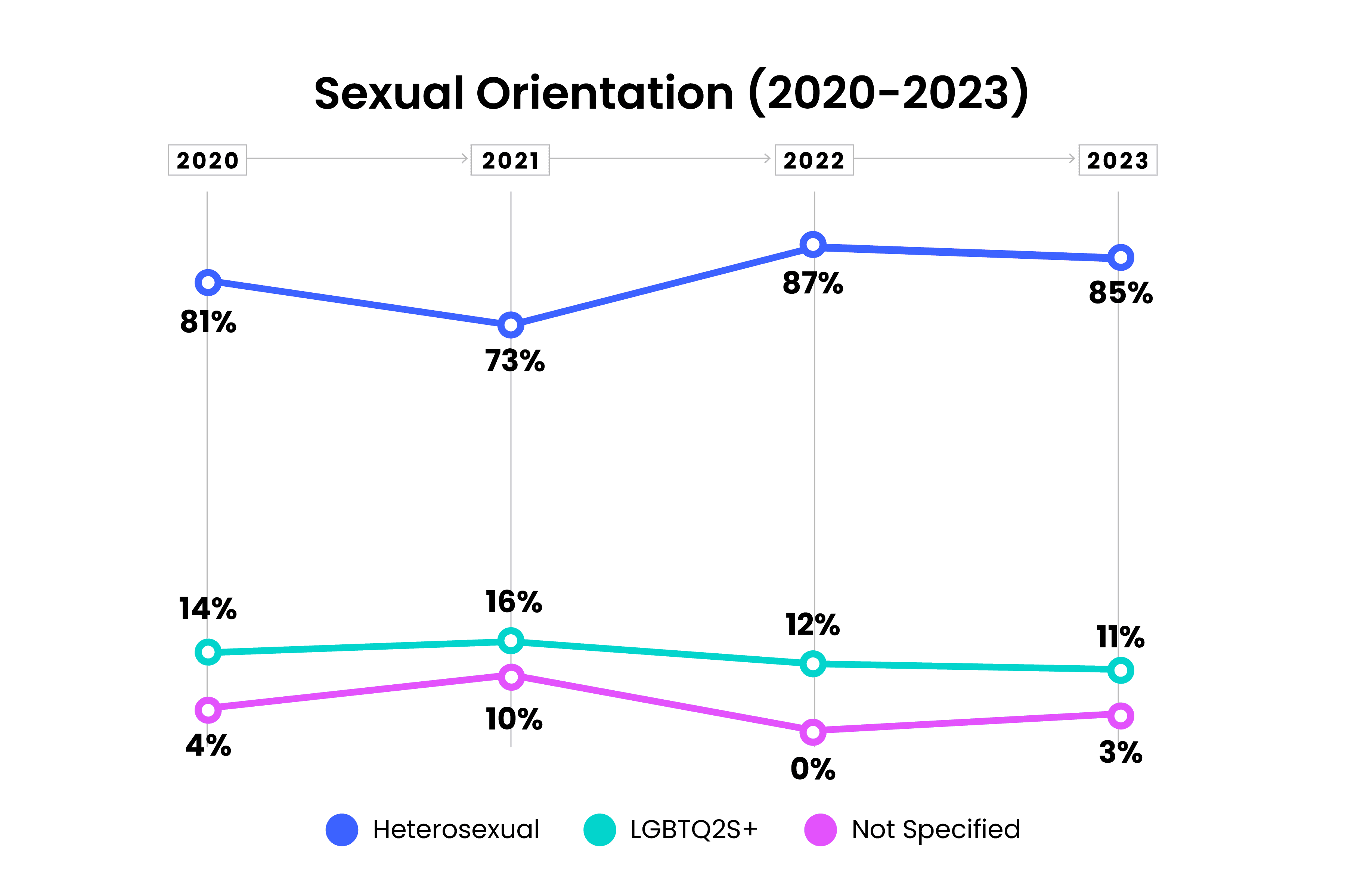
Leadership Representation
In addition to understanding the demographics of Loopio employees, it’s important to understand the demographic makeup of our management team since they are responsible for hiring, promotion, and leadership decisions.
That’s why we think about representation in management in two ways:
- Demographics of our management team vs. Demographics of the entire company. Representation within the management team is important for encouraging diverse perspectives, as well as mentorship, career progression, and belonging.
Below, you can see the representation of our management team, which we define as anyone in a people manager role (including our C-suite).

- How we benchmark against ourselves. We’re also thinking about how diverse our management team is becoming based on previous years.
Between 2022 and 2023, we increased our representation of women in management roles from 55% to 61%. In addition, our representation of BIPOC managers increased from 28% to 34%.
We did, however, note a decrease in LGBTQ2S+ managers over the past year. Representation of LGBTQ2S+ in leadership is important to Loopio, and as we continue to grow in 2024 and beyond, we hope to see an improvement in this demographic group.
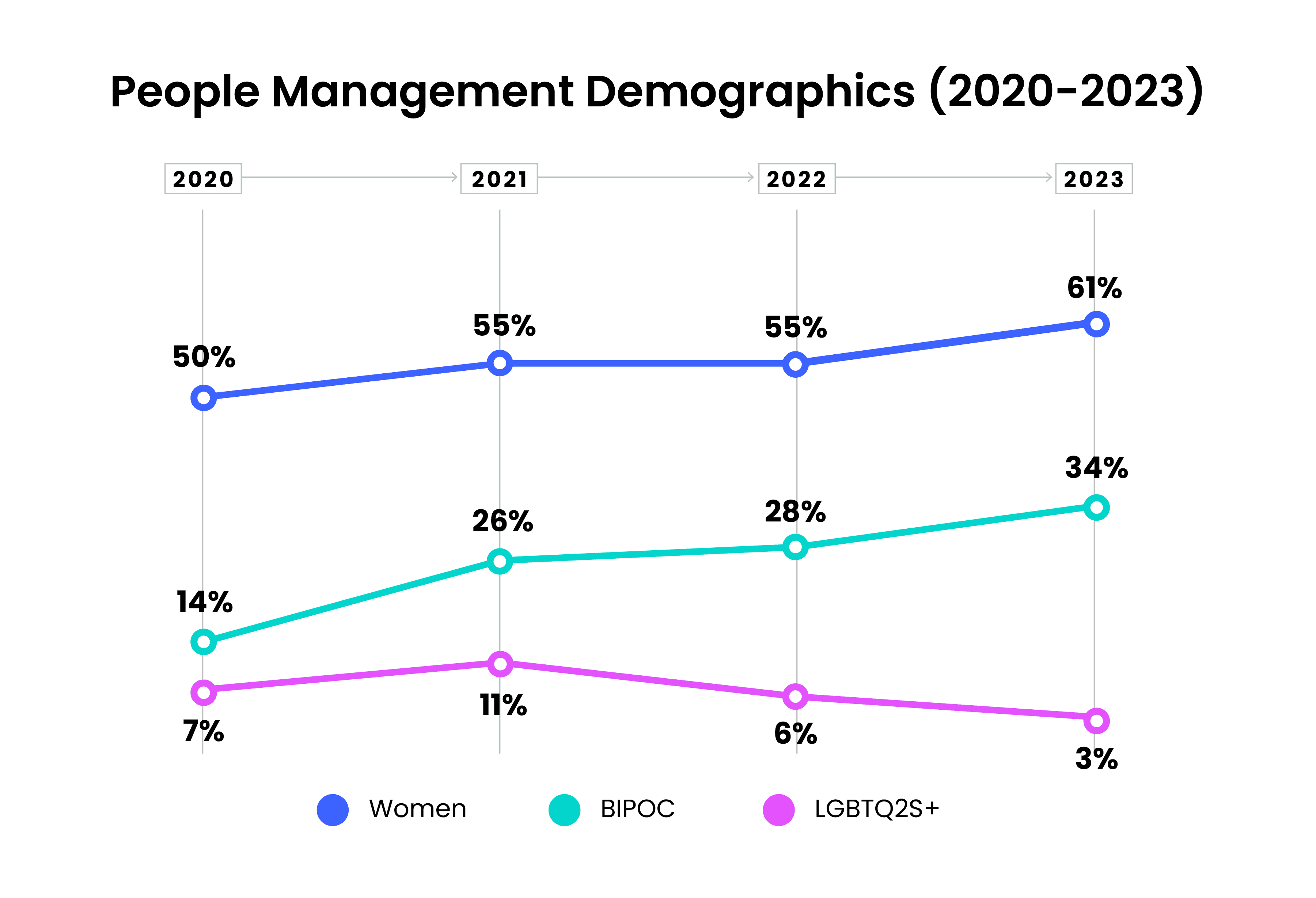
Where We’re Going: 2024 and Beyond
As we look to 2024 and what’s coming next, there are a few things to note.
First of all, our company is growing. With the addition of two new geographies through an acquisition last year, we’ve added new cultural perspectives to our team. We are adapting to working in multiple time zones. We now have hubs in Toronto, Vancouver, the UK, and India. As the shape of our company changes and as we continue to grow, we’re focusing on a few key areas:
-
Focus 1: Leadership
In 2024, we continue to focus on building a diverse & inclusive workplace, and the theme that’s most important to us this year is leadership. We’ve learned in the last couple of years how important it is to define great leadership. That’s why we are focused on building a framework for what it means to be a great leader by hosting training sessions and continuing to strengthen our leadership team.
-
Focus 2: Thinking Globally
We have commenced hiring across many teams, including in our new India hub. As we expand our team, we’re focused on adapting to be inclusive globally. This includes adapting our internal events (to respect time zones) and supporting culturally significant celebrations (for instance, celebrating Diwali with an India-based team).
-
Focus 3: Empower our Employee Resource Groups (ERGs)
Loopio has four employee resource groups (ERGs) that any Looper can join. Each ERG is employee-led, with two volunteer co-chairs who encourage members to connect in a safe space, amplify underrepresented voices, and share educational resources with each other and the company.
Our ERGs represent Loopers who belong to, or are allies of, the following groups:

Over the last few years, we have listened and learned from our ERG members, who have had impactful and tangible ideas about improving Loopio as a workplace. We have continued our investment in our ERGs through:
- Formalized ERG Budgets: We create an annual budget for each ERG to support their events and initiatives.
- ERG-Focused Onboarding Sessions: Every new Looper’s onboarding includes a session about our ERGs to educate new Loopers about their important role at Loopio.
- Leadership Training: All ERG co-chairs are invited to participate in management training as an investment in their leadership development and their functional roles across the company.
In Closing
We’re committed to investing in diversity, equity, inclusion, and belonging because it is the right thing to do and because it is a key driver in our company’s success. We are confident that together as #OneTeam, we can and will continue to build a world-class workplace where everyone is respected, valued, and has the opportunity to succeed.
If you have questions about anything in this report, please contact work@loopio.com.

